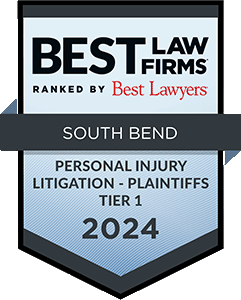 When filing a claim for compensation after an accident, your medical history is going to be a focus of the case because you are asking that another person or party pay for your medical bills among other damages. The insurance company is going to ask for proof of your injuries by requesting your medical records.
When filing a claim for compensation after an accident, your medical history is going to be a focus of the case because you are asking that another person or party pay for your medical bills among other damages. The insurance company is going to ask for proof of your injuries by requesting your medical records.
Our South Bend personal injury lawyers understand the need to disclose your medical records in a way that not only protects the value of your claim but also protects your right to privacy.
Your Rights Under the Health Insurance Portability and Accountability Act (HIPAA)
There is legal precedent from the courts establishing a right to privacy, but under HIPAA, you have a clearly outlined right to medical privacy under the law. There are only certain exceptions as to who, besides you, can be authorized to review your private medical information. Those exceptions include:
- Parents or legal guardians of a minor child
- Legally appointed representatives for another adult
- Legally appointed representatives of a deceased person’s estate
Aside from the right to keep your medical records private, you also have the right to disclose those records to whomever you wish, so long as you provide written authorization. Permission is usually given in the form of a wet signature, which means a non-electronic signature.
Can I Be Legally Obligated to Release My Records?
You may be legally obligated to release your medical records if you are ordered to do so by a court, which generally happens when a lawsuit is filed.
During the discovery process of the lawsuit, the liable insurance company is likely to ask for a copy of your medical records to prove your injuries. Failure to comply with the request may lead to a court-ordered release of those records.
Why You Should Release Relevant Medical Records
Proving you suffered an injury in an accident caused by someone else’s negligent actions is a central issue in an injury claim. That means releasing your medical records is a very important part of your claim. Disclosing your records may help you prove the extent of your injuries and how much treatment you require to help you reach maximum medical improvement.
However, how much of your medical records are disclosed to the insurance company may depend on what legal avenue you are using to recover compensation.
If your claim is still in the negotiation process with the insurance company, you may only need to disclose post-accident medical records to the liable insurer.
Be wary of any paperwork the insurance company asks you to sign, as they may try to get you to sign a blanket release form authorizing them to review your entire medical history. Insurance companies are notorious for digging through every file to try and find some reason to deny or devalue your claim.
Instead of allowing the insurance company access to your medical records, it would be in your best interest to allow your attorney the access so he or she may review your records and help you determine what to disclose, in accordance with the law.
Will Prior Injuries Affect My Claim?
Many injury victims are wary about fully releasing their medical records due to prior injuries or preexisting conditions because they believe they will not be able to recover any compensation.
While it is important to be concerned about what the insurance company may do with that type of information, you should disclose preexisting injuries and conditions to your attorney, so he or she is prepared to rebut any claims from the insurer that you were not injured by their insured.
Even if you do have prior injuries or were more susceptible to serious injuries due to a preexisting condition, you may still be able to recover compensation for damages that resulted from this new accident under the eggshell skull rule.
If you are concerned about how your claim may be affected by prior injuries or conditions, speak to one of our licensed attorneys as soon as possible. Remember that when you retain an attorney, most conversations, including written ones, are subject to the attorney-client privilege which makes the content of those interactions private and not subject to discovery.
Speak to a Licensed Attorney. Call Today
Disclosing your medical records during your injury case is important because those records may help prove your injuries are directly associated with the accident.
Our licensed lawyers are prepared to help you through the process of filing a claim and releasing your medical records in a way that may help maximize your compensation and retain your privacy.
We offer a free consultation and there are no fees unless we win.
Call (844) 678-1800 today.











